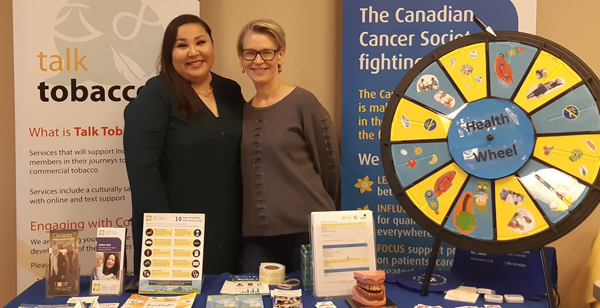Talk Tobacco quitline offers Indigenous language service
- Suliman Adam | March 28, 2021
Indigenous smokers who want to quit, now have access to a helpline that offers translations in 16 languages, including Cree, Saulteaux and Chipewayan.
The Canadian Cancer Society’s free Talk Tobacco “quitline,” has coaches who help create culturally appropriate, personalized quit plans and offer suggestions to cope with cravings and withdrawal symptoms.
Demi Benjoe, a senior specialist with Talk Tobacco, said they have partnered with CanTalk, a third-party translation service to provide the translators.
“We try to find the right translators for that right call to provide that guidance and support for those wanting translation services in Indigenous languages,” Benjoe said.
The high smoking rates among Indigenous communities need to be addressed and they want these services to be available if they choose to use them, she said.
“We don’t want to push or try to make somebody quit smoking or vaping,” she said. “We just want to make sure that service is adapted and made successful for Indigenous People here in the province.”
Commercial tobacco use is the leading cause of preventable disease and death in Canada. It is responsible for 30 percent of cancer deaths, Benjoe said.
Nathan Arias from Red Pheasant First Nation is a podcast host and social worker who was a smoker for more than 25 years. He quit after turning 40.
Now 43, Arias said his health and his daughter are the main reasons for his quitting.
“You have to want to quit,” he said.
He remembers thinking, “If I quit now, I might have a chance to get to an older age, and I can get in shape.”
“I found it cutting into my job, I would start thinking about when I could go smoke, that was my mindset,” he said.
“When you’re working at an office setting, your life revolves around those breaks, and I would get headaches from smoking so much and not drinking enough water.”
He had tried a few times to quit, but a series of motivational videos and allowing himself a reasonable amount of time, were his key to kicking the habit.
“You have to remind yourself that you’re not a smoker,” he said. “I set a deadline and reminded myself: I didn’t stop saying, ‘I’m not a smoker.’”
“I woke up one day and I just quit, I wasn’t craving it anymore, it just happened,” he said.
“I smell that smoke, get grossed out by it, and just leave, no temptations whatsoever.”
“It’s easy to quit, but also it’s probably the hardest thing in your life.”
For support in quitting, call 1-833-998-TALK (8255) to speak to a Quit Coach or visit www.talktobacco.ca to find out more.

